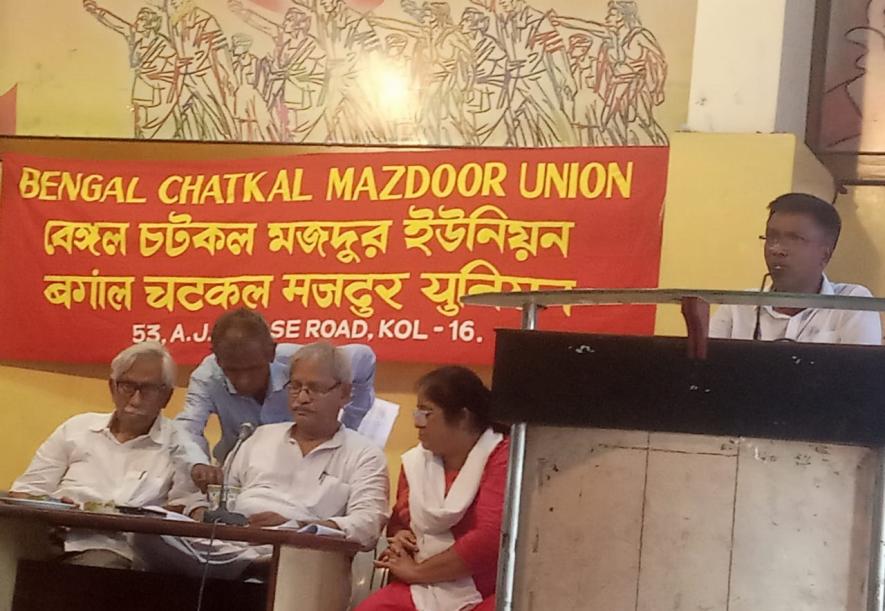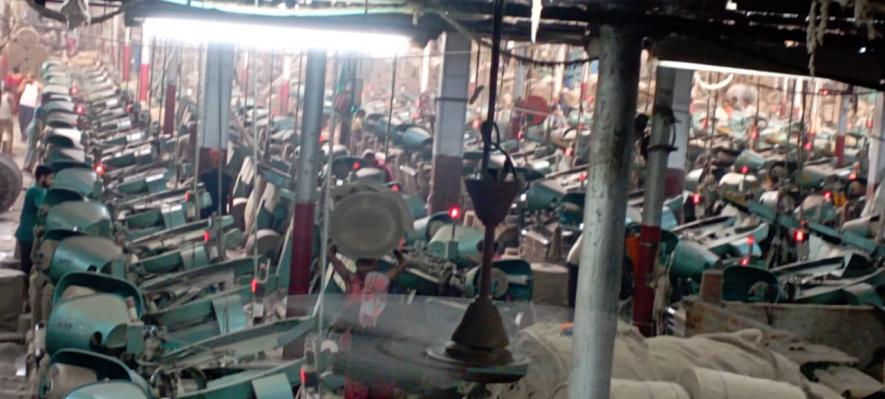WB: Jute Workers to Launch Big Protest to Demand Tripartite Agreement

Kolkata: Jute workers are gearing up for a significant protest over the coming months as they demand a tripartite agreement to address their grievances. The workers said they face exploitative conditions and spoke out against jute mill owners for defaulting on retirement dues and provident fund (PF) payments to their employees.
Mangal Benbangshi, a 44-year-old worker at Bally Jute Mill, told NewsClick about the challenges they are facing. "Police are harassing us, and local MLAs and councillors from the ruling TMC (Trinamool Congress) party are aligning with jute mill owners, aiding the mills in evading PF dues. Additionally, there's an unmet demand from the last tripartite meeting – for every 90 permanent workers, there should be a maximum of 20 special badlee workers. However, mill owners have not adhered to this ratio," he said.
The introduction of contractual workers without PF, Employee’s State Insurance Scheme (ESI), or gratuity provisions is altering the traditional work dynamics in jute mills. These workers said they were being paid as little as Rs 200 per day in some mills, significantly lower than the sector's minimum wage of Rs 370. Despite this, the state government and the Indian Jute Manufacturers Association (IJMA) have been reluctant to convene a tripartite meeting to discuss wage revisions and working conditions.

Benbangshi said, “Under the leadership of the Centre of Indian Trade Unions (CITU)-affiliated Bengal Chatkal Mazdoor Union, the industry's largest workers' body, all 22 jute mill workers' unions recently gathered in Kolkata to demand a date for the tripartite meeting. The unions resorted to even gheraoing the labour department seeking prompt government action."
The workers said the working days have been reduced from six to four or five days a week, causing problems for jute mill workers. In addition, protests have resulted in workers being expelled from the mill premises by bouncers hired by management, they alleged. Furthermore, there's a concern about women being forced into night shifts, an environment unsuitable for them, said some union leaders.
The IJMA, benefiting from the state government's stance, has put forward a proposal to enforce anti-worker labour codes that allow ‘hire-and-fire’ in the industry. Jute mills are now dependent on government orders, as local orders have declined, and reduced quotas for eco-friendly jute bags have impacted demand.
Gargee Chattopadhyay, working president of the Bengal Chatkal Mazdoor Union and a CITU leader, told Newsclick, "All these changes seem to favour the Gujarat-based plastic lobby, which provides plastic bags for food grain transportation."
Among the jute mill workers' demands are minimum monthly wages of Rs 26,000, the implementation of a grade and scale pay system, Dearness Allowance (DA) at Rs 2.50 per point, a 20% house allowance, inclusion of all workers' names in the master roll, and the elimination of contract and agency workers in favour of only permanent and special badlee workers.
The workers also demanded that the man-machine ratio be maintained before installing new machines, clearing of all pending gratuity and PF dues, reopening closed jute mills, avoiding recruitment of women in night shifts, continuing the tradition of break duty, limiting strenuous jute millwork to eight hours, and ensuring a 20% bonus rate. The Bengal Chatkal Mazdoor Union has called for immediate discussions on these 27-point charter of demands with the state government.
Get the latest reports & analysis with people's perspective on Protests, movements & deep analytical videos, discussions of the current affairs in your Telegram app. Subscribe to NewsClick's Telegram channel & get Real-Time updates on stories, as they get published on our website.
























